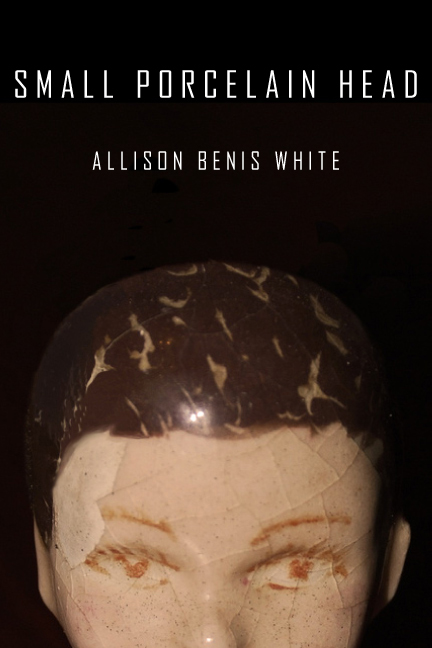
paper • 72 pages • 15.95
ISBN-13: 978-1-935536-27-7
Read an Interview with Allison Benis White for 32 Poems
From the rudderless space of raw grief, the urgent poems in Small Porcelain Head navigate the intangibility of death through tangible objects and artifacts. “What is left but obsession, handling the object over and over? My hands fit around her waist.” Specifically, these poems concern themselves with lines from a found suicide note and with dolls, whose incessant physicality seems to mock the transience of life: “The arm is wood and narrows into the wrist…to have one thing I love carved from everything.” The suicide note lingers as a final conversation and a final plea: “Please forgive me. I pray and can’t make it stop.”
A pained edge of franticness cuts through Small Porcelain Head as we witness the speaker’s struggle to function within the void left by death: “Not to let go or have to.” And with death, too, comes the questioning of God who, in these poems, might be “everything…this emptiness and eyelids that close when her head is tipped back” or who might be nothing, “only white streamers left over from evening, collected like women who have fainted.” In the wake of a death when God is an uncertainty, these poems long for “the outline of a star, so there was something to touch.”
From Small Porcelain Head:
What is left but obsession, handling the
object over and over? My hands fit around
her waist.Unbuttoning, I wanted nothing to happen
or the same thing to happen forever in the
same place.
Although it is better, it is impossible to
miss one thing or when you go, to miss
yourself.
Soon the object must grow or become
invisible, so familiar it is so hollow you are
inside.
I have lost all hope for myself, she wrote,
meaning there is one coat left which has
failed.
We have already undressed. Once I thought
what could happen was only what I could
imagine.
“This brilliant book-length collection of prose poems transforms a death into a haunting. Small Porcelain Head is written into the fragility, the already shattered state of loss: I left a sweater on a train in Dover last fall—if I would have shivered, noticed emptiness or shoulders. The site of brokenness functions as both the location of the lyric and the moment of release for the living—bereavement or descent into the suicide of the relinquished life are parallel ways of letting a voice go. The landscape of these poems recalls a musical score where despair flees and chases itself eternally…I was mesmerized.” — Claudia Rankine, Judge, The Levis Prize in Poetry
“White’s new collection is a book-length elegy for a suicide—a friend—in which the repeated image of the doll becomes a treacherous object, a Janus-faced god, and an elegiac substitution trope that seems by turns personal and mythic. White’s poems are musical, obsessive, gestural, and stark, and they evince the author’s elliptical approach to a submerged narrative inflected with enigmatic, nearly symbolist signs.” Read the full review.
“White’s poems, however, are about so much more than one person’s suicide: they explore the complex ways we relate to life and death…they are poems of woodworking and glassworks, of painting and construction, of working with the hands because the mind is breaking.” Read the full review.
“What astonishes about this collection is White’s rigorous examination of her own project and process in poem-time, a refined flaying. Just as Bishop’s drafts attest to the codependence of emotional and aesthetic honesty, White asks herself, and us, the grave and necessary questions: ‘Is this the beauty to be made from suffering? Or is this just suffering, through witness, glorified?’” Read the full review in the Spring 2015 number 42 issue of Birmingham Poetry Review.